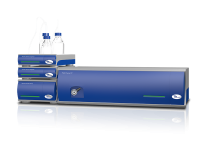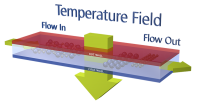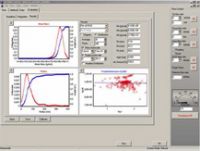TF2000 Thermal FFF
The most Advanced System for Separation of Natural and Synthetic Polymers and Gel Particles!
Professional Modular System
The new award winning Postnova TF2000 Thermal FFF Series was invented to become the first professional modular Thermal FFF system available. It is completely integrated by the NovaFFF single software platform which runs the entire system from autosampler to detectors. The TF2000 Series incorporates the combined solid know-how and the proven technologies from three decades of leadership in FFF. Due to its unique design the TF2000 Thermal FFF system offers more flexibility, higher robustness and better performance than traditional chromatographic systems. A separation column with stationary phase is not required anymore and consequently the TF2000 technology sets a complete new standard and offers a real alternative to column-based polymer characterization techniques.Broad Separation Range
The TF2000 system has a wide separation range and is able to separate small and large molar masses with high resolution. This allows the separation of various polymers, such as starches, polystyrenes, polymethylmetacrylates, synthetic and natural rubbers as well as other elastomers. In contrast to traditional chromatographic separation techniques, such as GPC/SEC, no sample treatment is necessary as the samples can be injected without filtration. This allows the characterization of quite complex polymer samples without any potential alteration and damage. Also, Thermal FFF has no Size Exclusion limit and because of this fact even ultra-high molar mass, branched and cross-linked polymers as well as gels, aggregates and particles can be separated.Molar Mass and Composition Separation
The TF2000 Series system is based on the Thermal FFF principle, using a temperature gradient as driving force for the separation. Polymers affected by this field show Thermal Diffusion which allows the separation by both the Molar Mass and Chemical Composition. This unique feature allows the separation of different polymer material having the same molar mass. The separation can be further optimized by the use of different eluents and various temperature programs. Therefore, the TF2000 can be ideally used for separation of complex polymer samples in the area of Petrochemical, Adhesives, Rubbers, Polymers and Nanomaterials.Advanced Thermal FFF Detection
In order to enable the user to fully access this wide application range, the TF2000 Thermal FFF is available with various add-on modules and special FFF detectors, such as Refractive Index (RI), Multi-Angle Light Scattering (MALS) and Dynamic Light Scattering (DLS). All Postnova FFF modules and FFF detectors have been especially designed for FFF and optimized not only for the use with the TF2000 Thermal FFF but also for the other Postnova FFF versions. Additionally, the TF2000 Series has been designed for easy interfacing with existing high-end detection technologies from leading instrument suppliers, so that the user can ideally integrate the Postnova FFF technology into the existing laboratory infrastructure in order to maximize efficiency and investment.


Why TF2000
Separation of Polymers, Gels and Particles
The TF2000 allows the simultaneous separation, characterization and fractionation of polymers, gels and particles within one measurement. The channel is reusable and only needs to be cleaned from time to time. There is no consumable which needs to be replaced frequently.Broad Separation Range
Other than in chromatography, the separation in Thermal FFF can also be performed for polymers from approx. 10 kDa up to molar masses of 10 GDa. No size exclusion effect is observed, making the TF2000 the ideal tool for the separation of large and ultra-large cross-linked polymers.Gentle Separation Conditions
Because of the open channel and the absence of any stationary phase the separation can be performed under the absence of shear forces and stress to the macromolecule. Typical chromatography problems, such as filtering/adsorption effects, shear induced chain degradation and late elution effects can be avoided.Broad Range of Eluents
Because of the absence of the stationary phase, nearly any kind of organic and even some aqueous liquids can be used in Thermal FFF. Only the thermal diffusion properties of the polymers under investigation need to be sufficiently strong in the given eluent. This allows to easily use also aggressive and otherwise difficult to use eluents such as DMSO for starch analysis etc. There is no need to add salt such as LiBr which is often essential in chromatography to avoid polymer interacting with stationary phases.R&D as well as QC Capability
Because the TF2000 does not use any membrane and is a very robust and easy to use instrument it can be easily employed as a routine tool for QC analysis 24/7 directly integrated into the chemical manufacturing processes. The TF2000 can be remote controlled, meets and conforms with the most stringent international security regulations and offers a series of automatic security features to allow unattended use. Temperature, pressure, leak and gas sensors are constantly monitoring the system for reproducibly and stable operation even in rough production environments.Flexibility & Interfaceability
The TF2000 series was developed to be used as Stand-Alone system or interfaced with existing chromatographic systems from various manufacturers. This gives the advantage that FFF and GPC/LC can be performed using the same set or detectors, providing 2D information.


NovaFFF Software
The NovaFFF software is based on a “one Software for all devices” strategy, incorporating system control, data collection and data evaluation as well as reporting.The easy to use NovaFFF Software:
- Very flexible: simple integration of hardware components e.g. autosampler, pumps and various detectors
- Important security and monitoring functions: pump and channel pressure, manually or automatically shut down of the system when a set maximum pressure value is exceeded
- Run data file: pressures, flows and additional analog detector signals are stored
- Log history file: main actions and controls are logged
- PC and LAN controlled: integration within the companies local network (LAN) with own IP address for every FFF system. State-of-the-art communication protocols using TCP/IP
- Unique FFF-LS Integration: controlling the FFF platform together with Light Scattering detector in just one application
Required Modules:
Sample Organisation:
Detectors:

Applications:
- Latex Coatings
- Nanoparticles
- High-Tech Materials
- Technical/ Industrial Polymers
- Starches
- Paints
- Polymers and Particles from approx. 10 kDa up to 10 GDa and more in organic/ aqueous solvents
General Sample Size and Molar Mass Range:
Polymers: 10 kDa-10 GDa
Particles: 10 nm-10 µm
Analysis Time:
Typical 10-120 min, no software limitation
Channel Dimensions:
Volume: 1.15 or 2.21 mL (130 μm or 250 μm Spacer)
Length: 456 mm
Breadth: 20 mm
Thickness: 130 or 250 µm
Channel Flow Rates:
Typically 0.01-2.0 mL/min
(other flow rates possible)
Carrier Liquids:
Organic solvents, only limited applicable for aqueous solvent
Detectors:
UV, RI, light scattering, fluorescence detection, etc.
multiple detectors in-line
Thermal-Field Strength:
Maximum ΔT up to 120°C
Hot wall maximum: 180°C
Cold wall maximum: 60°C
(THF, 220 V, coolant water at 20°C, 12 L/min)
Temperature Control:
PC controlled for accurate, constant and programmed field options
Channel Pressure:
Up to 200 psi (approx. 14 bar) to pressurize the channel for any analysis at higher temperatures
System Requirements:
220-230 V, 50/60 Hz; 12 A for basic set-up
max. power consumption 3.5 kW (depending on cooling system, carrier liquid and used voltage)
Coolant water at 20°C, 12 L/min, max. 2 bar
System Software:
NovaFFF TF2000
Integrated Software Platform
Maintenance:
Rugged reuseable channel with no special maintenance required
Injection Volume:
1-1000 µL
Standard 20 µL
optional > 1000 µL
Injected Sample Mass:
Up to 500 µg and more; depending on sample characteristics; Typical injection mass 20-100 µg
Injection Method:
Via Rheodyne© manual injection valve or autosampler with different options
Dimension (L x W x H):
820 x 490 x 235 mm
Weight:
53 kg



